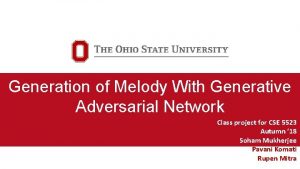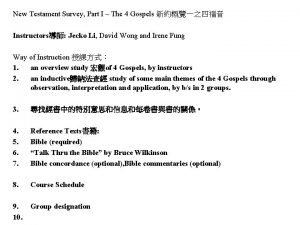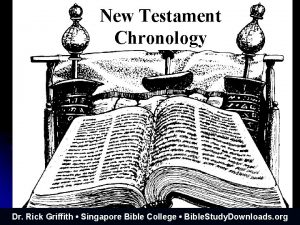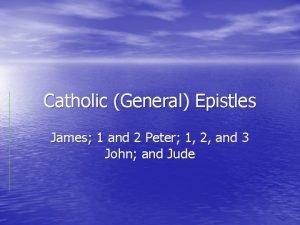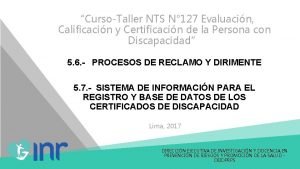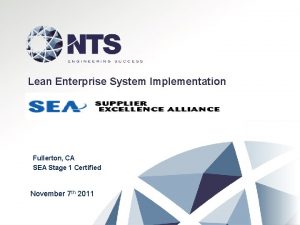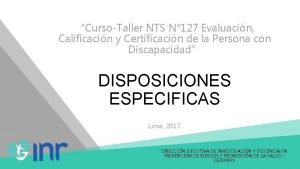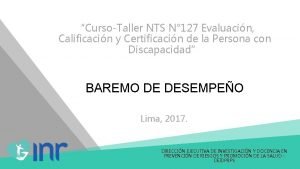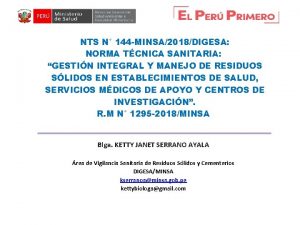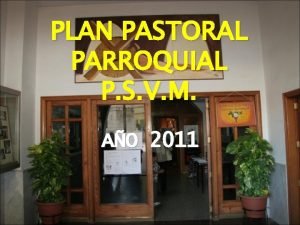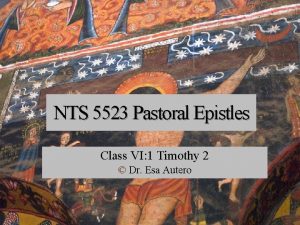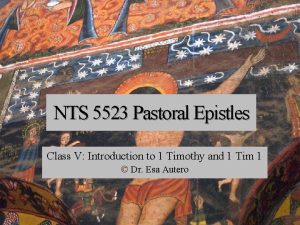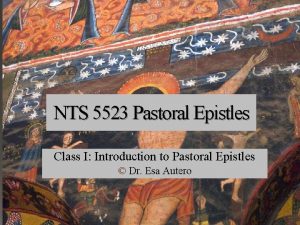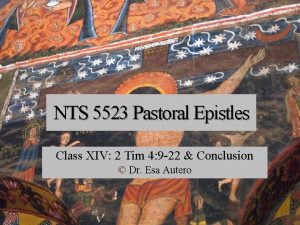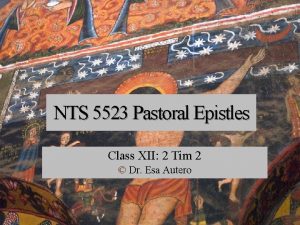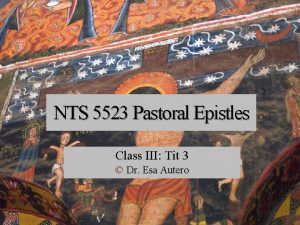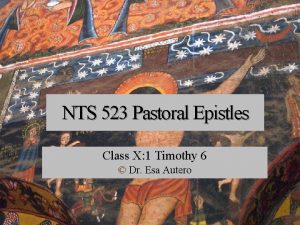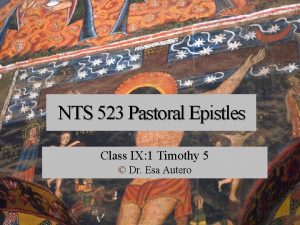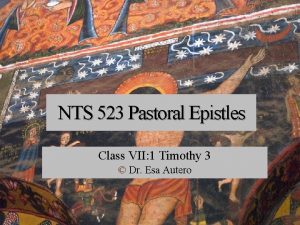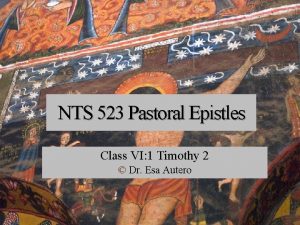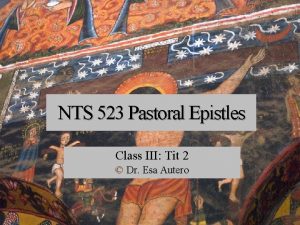NTS 5523 Pastoral Epistles Class IX 1 Timothy

















- Slides: 17

NTS 5523 Pastoral Epistles Class IX: 1 Timothy 5 © Dr. Esa Autero

1 Tim 5 21 I solemnly charge you in the presence of God and of Christ Jesus and of His chosen angels, to maintain these principles without bias, doing nothing in a spirit of partiality. (1 Tim 5: 21) Διαμαρτύρομαι ἐνώπιον τοῦ θεοῦ καὶ Χριστοῦ Ἰησοῦ καὶ τῶν ἐκλεκτῶν ἀγγέλων, ἵνα ταῦτα φυλάξῃς χωρὶς προκρίματος, μηδὲν ποιῶν κατὰ πρόσκλισιν. (1 Tim. 5: 21) 21

1 Tim 5 1. 1 Introduction to 1 Timothy 5 • Any specific topics that catch your attention in 1 Tim 5? • Any specific sections that have been used for • Doctrinal formulations? • Practical considerations in church or society? • Any questions/comments arising from the assigned readings?

1 Tim 5 1. 2 Structure and Rhetoric of 1 Timothy 5 • 5: 1 -25 – Instructions to different age groups & elders • Instructions to various age groups (5: 1 -2) • Older and young men (5: 1) • Older and younger women (5: 2) • Widows, church, and families (5: 3 -16) • True widows (5: 3 -8) • Older and younger widows (5: 9 -16) • Honoring & disciplining Elders (5: 17 -22) • Miscellaneous instructions (5: 23 -24) Notice the 2 nd person (“you”) and 3 rd person (he/she/they) instructions • -- what do they tell about the responsibilities in the congregation?

1 Tim 5 • Rhetorical purpose of 1 Tim 5 • Three discussions linked with “honor” (5: 3, 17; 6: 1) – widows, elders, masters Witness to the world a major concern • Instructions to various groups • “reversed” household code • Timothy’s responsibilities to the various groups – less emphasis on the groups’ own responsibilities (see 2: 8 -3: 13; Tit 2: 1 -10) • Length of admonitions – due to importance of the subject in Ephesus Comparison and contrast – synkrisis (true/false widows & “worthy” and “unworthy” elders)

1 Tim 5 2. 1 Exposition of 1 Tim 5 • Instructions to older & younger men & women (5: 1 -2) • Older men (presbytero) – speak as to father • Men in their 50 s • No harsh rebuke (epiplekses)* but gentle encouragement to right path • Younger men – treat like younger brothers • Older women (50 s) like mothers • Younger women as sisters Concern for age and gender relations (cf. 4: 12) • In “absolute purity” to avoid any hint of scandal (cf. 5: 11) “For no matter whom he meets, he will feel he is meeting a brother, a sister a father, a mother, a son, a daughter” (Plato, Resp. 5. 463 c)** Relate to people in the church as true family members

1 Tim 5 • Widows, family, and the church (5: 3 -16) • Gk. chera – broadly a woman w/o husband • Also divorced woman who remained unmarried • Narrowly – woman whose husband deceased (e. g. Lk 2: 37; Mk 12: 43; Lk 20: 37; Jam 1: 27) • Gk. parthenos – younger woman not married (1 Cor 7: 25 -38) • Hb. almana – woman whose spouse deceased and doesn’t have means to support herself • Widows sometimes left adrift in the Greco-Roman world • Important to care for widows (Ex 22: 22 -4; Deut 10: 18; 14: 29; Sir 3: 12 -14) • “True widow” (tas ontos cheras) – to be honored • Cared for physically & granting dignity – “honor” = physical support that befits widows (cf. 5: 4, 8, 17; Ex 20: 12; Deut 5: 16; Eph 6: 2; Mk 7: 10)

1 Tim 5 18 He executes justice for the orphan and the widow, and shows His love for the alien by giving him food and clothing. (Deut 10: 18; 24: 17) “Cursed be anyone who deprives the alien, the orphan, and the widow of justice. ” All the people shall say, “Amen!” (Deut 27: 19) My child, help your father in his old age, and do not grieve him as long as he lives; 13 even if his mind fails, be patient with him; because you have all your faculties do not despise him. 14 For kindness to a father will not be forgotten, and will be credited to you against your sins; 15 in the day of your distress it will be remembered in your favor; like frost in fair weather, your sins will melt away. 16 Whoever forsakes a father is like a blasphemer, and whoever angers a mother is cursed by the Lord. (Sir 3: 12 -16)

1 Tim 5 • Was there an “office of widow”? Cf. 5: 9 -12 (a) Office due to character qualification – similar to elders & deacons* OR (b) “True widows” – qualifications for church’s aid program due to limited resources of the church • Widows already engaged in the ministries in the church • “(b)” seems like a better option – only some qualified due to lack of resources – first priority of help lies within the family • Duties of family and widows – “let them learn…” eusebein • Children and grandchildren as first line of help • Repayment for parents – reflection of the 5 th commandment (Fee, 116) • “this is pleasing to God” – echoes sacrificial language in Lev. • Religious duty of the children (μανθανέτωσαν πρῶτον τὸν ἴδιον οἶκον εὐσεβεῖν; 5: 4)

1 Tim 5 • “True widow” – (truly) alone in the world • Trusts God & prays continually (Lk 2: 36 -38; 18: 1 -8) • “living-dead widow” lives for pleasure • Family that doesn’t provide for one’s own “worse than an unbelievers” (3: 2; 5: 7; cf. 1 Cor 5: 1) • Neglect of providentia* “faith” involves doctrine and way of life Unbreakable connection b/w Neglect of widows probably a problem • Qualifications for the “true widow” faith and its practical outcome • “enlisting” of widows (katalegestho) • Enlisting of soldiers, senators & religious community (Herodotus, Persian Wars 1. 59; 7. 1; Plutarch Pomp. 13. 7; P. Oxy 416, line 4)

1 Tim 5 • Qualifications for widows (5: 9 -10) • Trust in God alone & “night & day prayers” (1 Sam 1) • “truly alone” – no husband/family; poor/marginalized 60+ - a typical • High age (60 yrs. + - in the “last stretch” of life) – why? age to rely on others • Beyond marriageable age & unable to work • “one-man-woman” – faithful to husband or married What kind of only once (cf. Lk 2: 36 -37) process was • Reputation for good works – “hindsight” not pre-req. this • Raised children – response to false teachers (2: 15; 4: 3)“enrolling”? • Hospitality (eksenodochesen) – (3: 2; Rom 12: 13) • Washed feet – literal washing* OR symbol for humble service • Helped/aided the afflicted, esp. poor (θλιβομένοις ἐπήρκεσεν**; 1 Tim. 5: 10) • “devoted to every good work” – summary of the character in practice

1 Tim 5 • Younger widows don’t qualify – sensuality & desire to marry – why? • What about Paul’s insistence that they marry in 5: 14? • What’s the “first pledge”? (τὴν πρώτην πίστιν ἠθέτησαν [set aside] 5: 12) • Special dedication to Christ? 1 Cor 7: 34 (cf. Philo Somn. 2. 273) • “first faith” – abandoning Christian faith for marrying an unbeliever • Desire to marry more important than Christ • Strong pressure to adopts husband’s faith (Plutarch Conj. Praec. 19) It behooves a woman not to make peculiar and private friendships of her own, but to esteem only her husband's acquaintance and familiars as hers. Now as the gods are our chiefest and most beneficial friends, it behooves her to worship and adore only those deities which her husband reputes and reverences for such. But as for quaint opinions and superstitious innovations, let them be exterminated from her outermost threshold. For no sacrifices or services can be acceptable to the gods, performed by women, as it were, by stealth and in secret, without the knowledge of the husband. (Plutarch Conj. Praec. 19) Widows shouldn’t abandon faith to remarry

1 Tim 5 Types of widows: 1) “True” widows 2) Widows w/ family 3) Young & wealthy • Younger widows – learn to be lazy & speak gossip • Probably high class women w/ time in hands (Juvenal Sat. 6. 224 -226, 398 -399) • φλύαροι καὶ περίεργοι [foolish talk and meddlers/talkers of magic spells (cf. Acts 19: 19)], λαλοῦσαι τὰ μὴ δέοντα; 5: 13) – meddling & foolish talk – perhaps a reference to New Roman Woman • Is this promulgation of the false teaching? – contra to truth (1: 6; 4: 7; 6: 20) • Paul’s instruction: marry, have children (2: 15; 4: 3) & “manage household” (oikodespotein) – so that adversary doesn’t revile Concern for the reputation of the church and gospel • Some turned to follows Satan – after false teachings (1: 19 -20; 4: 1 -4; 6: 10, 21) • Women of means are to support their widows – not to burden church • Means and status of these women presupposed

1 Tim 5 • Elders – honor & discipline (5: 17 -22) • “twofold” honor to preaching/teaching elders • Respect and remuneration (cf. Acts 28: 10; 4: 34) • Elders govern (proistemi) “well” – contra false ones • Implies that all elders govern but only some preach and teach (cf. Acts 6: 2 -4) • Theological basis for “twofold honor” – Scripture • Ox & yoke (Deut 25: 4) & Jesus’ words (Lk 10: 7*) • See also 1 Cor 9: 9 (agrees w/ 1 Tim 5: 18**) • Jesus’ words & OT equally authoritative • Strong rhetorical/theological support for honor & support of elders – OT Scripture & Jesus’ words Were elders not respected? Were they financially deprived?

1 Tim 5 • Accusations against elders (5: 19 -22; cf. 1: 3) • Rule of two or three witnesses (cf. Deut 19: 5) – complaints need to be allowed but only legitimate ones w/ proper evidence • Those sinning need to be rebuked – public rebuke as a warning • Public rebuke (elengche*) a strong deterrent in honor-shame culture Did this also mean removal from eldership? • Importance of the instructions underlined – God, Christ, elect angels? • Presence of “heavenly host” in the participation of judgment • Timothy is to be very careful in executing these instructions Impartiality highlighted in light of judgment • Hasty ordination – incurs (partial) judgment on Timothy • Timothy’s responsibility in setting up (new) elders to replace false teachers (cf. 1 Tim 1: 3, 19 -20; 4: 1 -6)

1 Tim 5 • Final instructions for Timothy (5: 23 -25) • Connection previous section? True purity and practical application & health • Recurring stomach illnesses – use wine • Medicinal purpose of wine & lack of suitable drinking water in Greco-Roman world in general • See Hippocrates Med. 13; Plutarch Tu. San. 19; • Pliny, Nat. 2. 19; Prov 31: 6; b. Ber. 51 a; Lk 10: 34 • Sins of some more evident than others – is this a reference to (potential) elders or for all people? • Probably implies the importance of choosing elders wisely • Good deeds and character of potential elders will show up eventually God is in ultimate control and will judge everyone in the eschaton

1 Tim 5 • Questions and directions for application – 1 Tim 5 • How should one apply the idea of “rebuking” different age groups in 5: 1 -2 today? • What is the church’s and family’s responsibility in in caring for needy members of the a) congregation; b) those in the community? • What criteria should be used? • What kind of honor and discipline is to be given to elders/leaders in today’s congregation?
 Cse 5523
Cse 5523 Daylight and champaign discovers not more
Daylight and champaign discovers not more Pauline epistles
Pauline epistles Chronology of pauline epistles
Chronology of pauline epistles Test: the general epistles
Test: the general epistles Test: the general epistles new testament survey
Test: the general epistles new testament survey Nts
Nts Hatron
Hatron Nts cervello
Nts cervello Nts 127
Nts 127 Nts radio frequency
Nts radio frequency Nts sr
Nts sr Nts 127
Nts 127 Nts fullerton
Nts fullerton Nts 127
Nts 127 Nts 127
Nts 127 Nts 144 residuos solidos
Nts 144 residuos solidos Plan pastoral parroquial
Plan pastoral parroquial
